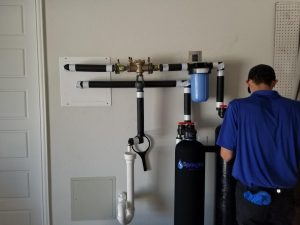What is Hard Water?
And How do you know if you have it?
While water is made up of hydrogen and oxygen (H2O), it also contains minerals and chemicals. The concentration of certain minerals is what creates the “hardness” of water.
What does hard water contain?
- Calcium
- Magnesium
- Trace amounts of other minerals

Certified Plumber from Trident Plumbing Installs a Water Softener & Filtration System
It’s a natural result of minerals like calcium and magnesium accumulating during the water cycle and it happens in approximately 85% of homes across the country – regardless of whether a home uses well water and or city water. The more calcium and magnesium dissolved in the water, the harder the water becomes. This is why certain cities and counties within North Texas can have varying degrees of water hardness.
While it is considered safe to drink, over time, hard water can lead to costly problems such as:
- Ugly stains in sinks and tubs
- Higher water bills because water appliances work harder
- Premature wear on expensive home appliances and even clothing
- Dry and itchy skin
Why is it important to know if you have hard water?
When you have hard water, the minerals that the water picks up can clog your pipes and create scale along the sides of the pipe walls. Eventually, your pipes could become too clogged to be effective anymore, causing damage and loss of water pressure.
What to look for:
Your sinks, tubs, showers, all hold residue – particularly a colored residue in your tile grout.
That orange residue in your shower, the calcium deposits around your faucet are both a result of hard water.
Your clothes are dull and never quite seem clean.
Do your clothes come out of the washer still dull or not quite white or clean? Did you buy a new washer and still have the same problem? Hard water is usually the culprit.
Your skin and hair (scalp) is itchy and dry.
Minerals in hard water can change the pH Balance of your skin, weakening it as a barrier against harmful bacteria and infections. If you have skin issues such as eczema or dermatitis, hard water can aggravate it. When washing your hair, shampoo will not suds up as much with hard water as it does with soft water. This generally leads to homeowners using more shampoo than necessary to wash their hair.
Household appliances don’t run efficiently.
Does your dishwater leave residue – even when you use an added drying agent? Is your dishwasher still relatively new and not cleaning the dishes as well as it should? Any appliance that uses water—washing machine, dishwasher, or water heater— can prematurely wear out in a house with hard water. Over time, mineral deposits can accumulate and block water supply lines and drain lines and can develop on internal components, such as the arms that spin in a dishwasher.
You notice slow-running faucets in your home.
While weak water pressure can be due to a number of factors, slow-running water could mean that there are mineral deposits in the water supply lines are blocking the water flow. If any of these symptoms sounds like it could be your house? Perhaps you should look at a water softener and filtration system.
Trident installs the Atlas Water Filtration System. Click here to learn more about Atlas Filtration Systems.
